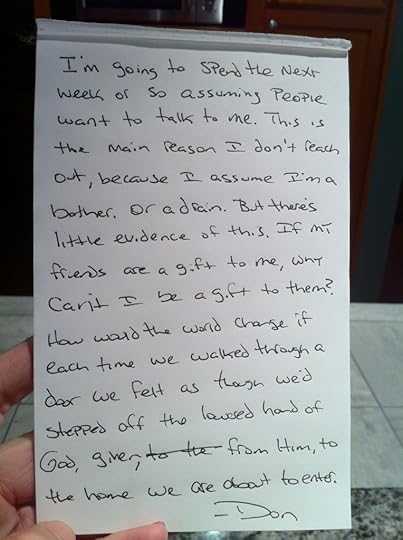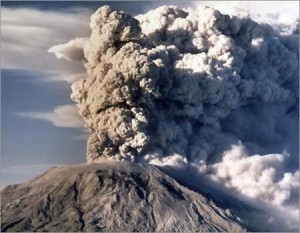Donald Miller's Blog, page 112
December 16, 2011
Our Crap Can Grow a Garden
December 12, 2011
What Would Change if You Believed People Actually Wanted to Talk to You?
What stinks is when you write a whole note, take a picture of it, throw it away, and realize you left a question mark off the end.
What Would Change if You Believed People Actually Wanted to Talk to You? is a post from: Donald Miller's Blog
December 9, 2011
What is Really Happening When We Laugh?
December 8, 2011
It's not what you do that scares me, it's what you hide.
Inspired by Rod Blagojevich and Jerry Sandusky
It's not what you do that scares me, it's what you hide. is a post from: Donald Miller's Blog
November 28, 2011
Mount Saint Helens and the Fall of Man
 When I think about God arriving in the Garden after the Fall, I think about Jimmy Carter arriving at the base of Mount Saint Helens after the eruption. It's just fifty miles across the river, Mount Saint Helens, and on a clear day you can see it from Portland. And I remember seeing Jimmy Carter getting out of his helicopter, the belly of the helicopter caked in mud, the sides of it gray with ash. Carter stepped down from his seat, his expression confused, troubled, all the pain of a region mapped in the lines of his face. And later, when I was twenty-one, I went to the place myself and tried to imagine it then. I imagined Harry Truman at Mirror Lake, refusing to leave despite the warnings. I imagined two thousand feet of this once great mountain coming down on him, sliding him and his lake over the next mountain and down the other side, displacing the body of water altogether. There were tremors, only a month of them, hardly a warning for a mountain that had sat dormant for a hundred years.
When I think about God arriving in the Garden after the Fall, I think about Jimmy Carter arriving at the base of Mount Saint Helens after the eruption. It's just fifty miles across the river, Mount Saint Helens, and on a clear day you can see it from Portland. And I remember seeing Jimmy Carter getting out of his helicopter, the belly of the helicopter caked in mud, the sides of it gray with ash. Carter stepped down from his seat, his expression confused, troubled, all the pain of a region mapped in the lines of his face. And later, when I was twenty-one, I went to the place myself and tried to imagine it then. I imagined Harry Truman at Mirror Lake, refusing to leave despite the warnings. I imagined two thousand feet of this once great mountain coming down on him, sliding him and his lake over the next mountain and down the other side, displacing the body of water altogether. There were tremors, only a month of them, hardly a warning for a mountain that had sat dormant for a hundred years.
A few years ago I drove up the winding road in my car, the fresh mountain air wafting in through the windows and swirling around in the backseat, the tall pines lining the road like statues, the round, tight corners walled on one side by cliffs and the other side by thousands of feet of descent, down to a blue river bright like a mirror through the canyon, shining silver and white over rocks, then back to blue in the pools, casting up against the same-colored sky. It was all so beautiful, I remember thinking. And then I hit the spot on the road where the trees stopped, and the landscape went dead, like the landscape after Hiroshima, as though the place had been bombed. There was no life, not a plant, not a tree, just gray ash flowing across the hills for thirty miles toward the crater.
I rounded the long steeps toward the visitors' center, which sits on a neighboring hill, the few green trees around which were the only life on what seemed to me an ugly, dry planet. And this is precisely how I began to feel, that I was no longer on earth, that I was in some other orb with some other climate and some other ecosystem, all of which was the product of some tragedy, as though the people who inhabited this place were destroyed or, if they lived somewhere out there in the ash, were walking around in a daze, having suffered a kind of concussion, trying to make a life in the ruined landscape. The placards at the door said ash had been carried as far north as Canada. Spokane, some three hundred miles away, was deluged with more than three feet of ash. Rivers were dammed, others created, and some of the rivers, filled with walls of ash and water from Mirror Lake, took out bridges with their muscle. The Columbia, the lifeline to this region and the second largest river in the United States, was shut down completely as ash brought the bed to only twelve feet.
My friend Danielle said she encountered the sight in the parking lot after church. She was a little girl then, walking out of the sanctuary holding her father's hand and staring confusedly as a mountain she and her family had known all their lives, some fifteen miles away, spit a plume larger than the cloud over Nagasaki, going up into heaven like some angry burst of earth. They must have thought the world was coming to an end.
All this makes me wonder what God must have felt, arriving on the scene just after the Fall, knowing all He had made was ruined, and understanding at once the sacrifice that would be required to win the hearts of His children from the grasp of their seducer. I see Him in my mind walking the paths, calling to the couple, meeting their eyes for the first time, and Adam and Eve shaking in absolute terror, wondering what had happened, confused at the broken promise of a snake, feeling at once the trustworthiness of their first love and wondering if God would ever love them again, feeling the hot breath of His anger and emotion, hearing Him speak for the first time, not as a friend, but as One who had been betrayed. "Who told you that you were naked?"
This passage was an excerpt from Searching for God Knows What.
Mount Saint Helens and the Fall of Man is a post from: Donald Miller's Blog
November 27, 2011
Sunday Morning Music – The Jayhawks
The Jayhawks have a new album out, Mockingbird Time, and it's probably great. But to me, it can't get any better than 1995′s Tomorrow the Green Grass.
Sunday Morning Music – The Jayhawks is a post from: Donald Miller's Blog
November 23, 2011
An Open Letter to My Fear of What Others Think
 Today's guest post is courtesy of Jesse Rice. Jesse is a speaker, musician, and author of The Church of Facebook: How the Hyperconnected Are Redefining Community. He and his wife, Katie, live in Seattle-ish, WA, and he blogs at www.churchoffacebook.com.
Today's guest post is courtesy of Jesse Rice. Jesse is a speaker, musician, and author of The Church of Facebook: How the Hyperconnected Are Redefining Community. He and his wife, Katie, live in Seattle-ish, WA, and he blogs at www.churchoffacebook.com.
Dear Fear-Of-What-Others-Think,
I am sick of you and it's time we broke up. I know we've broken up and gotten back together about a bazillion times, but seriously, Fear-Of-What-Others-Think (or FOWOT, for short), this is it. We're breaking up.
Because I'm tired of over-thinking my status updates on Facebook, trying to sound more clever, funny, important. And I'm tired of wondering which Tweets might drive the most traffic to my blog, as though my value as a human being were truly numerical.
I'm tired of wondering which picture to post online so that my in-danger-of-over-expanding gut doesn't hang out too much and cause others to think I'm a normal late 30-something male, God forbid. Or that I vacation not in Hawaii or Paris or rural Vietnam, but in central Oregon, if I can afford to go on vacation at all.
I'm sick of feeling anxious about what I say or do in public, especially around people I don't know that well, all in the hope that they'll like me, accept me, praise me. Those who already like me, accept me, and even praise me; those are the ones I'm constantly trying to keep happy. I run around all day feeling like a freaking Golden Retriever with a full bladder. Like me! Like me! Like me!
And I'm SO tired of feeling bad about myself all the time. Bad about how I look. Bad about my job. Bad about my net worth (which is currently quite RED in color). Bad about my 12-year-old car and my one-fashion-season-behind clothes. Bad about my prospects for wealth and fame and Nobel Prize-winning ideas. Bad about my community, or lack thereof.
Because of you, I go through my day with a cloud of shame hanging over my head, blocking the sun, keeping my throat sore and my nose consistently runny and my eyes all squinty like a newborn. And I HATE that.
Because when I'm afraid of what others think, I never stop acting. The spotlight's always on and I'm center stage and I'd better keep dancing, posturing, mugging, or else the spotlight will move and I'll dissolve into a little meaningless puddle on the ground, just like that witch in The Wizard of Oz. I can never live up to the expectations of my imaginary audience, the one that lives only in my head but whose collective voice is louder than any other voice in the universe.
And since I know I'm acting and since I know the spotlight's always moving and since I know that in the bigger picture none of this matters a rat's patootie, I'm never content to simply be myself.
And all of this is especially horrible, terrible, evil because if I really stop and think about it, and let things go quiet and listen patiently for the voice of the God who made me and delights in me, it turns out I'm actually – profoundly – precious, lovable, worthy, valuable, and even just a little ghetto-fabulous.
When I listen to that voice then your voice starts to sound ridiculous again. You turn back into the tiny, yapping little dog that you are.
So eat it, Fear-Of-What-Others-Think. You and I are done. And no, I'm not interested in "talking it through." I'm running, jumping, laughing you out of my life, once and for all. Or at least, that's what I really, really want, God help me.
Sincerely, Jesse
An Open Letter to My Fear of What Others Think is a post from: Donald Miller's Blog
November 22, 2011
We Don't Want to Change
 A general rule in creating stories is that characters don't want to change. They must be forced to change. Nobody wakes up and starts chasing a bad guy or dismantling a bomb unless someone forces them to do so. The bad guys just robbed your house and are running off with your last roll of toilet paper, or the bomb is strapped to your favorite cat. It's that sort of thing that gets a character moving.
A general rule in creating stories is that characters don't want to change. They must be forced to change. Nobody wakes up and starts chasing a bad guy or dismantling a bomb unless someone forces them to do so. The bad guys just robbed your house and are running off with your last roll of toilet paper, or the bomb is strapped to your favorite cat. It's that sort of thing that gets a character moving.
The rule exists in story because it's a true thing about people. Humans are designed to seek comfort and order, and so if they have comfort and order, they tend to plant themselves, even if their comfort isn't all that comfortable. And even if they secretly want for something better.
I heard an interview on the radio with a woman who worked with people in domestic abuse situations. She said most woman who come to her for help go back to the situation they came out of, back to the man who abused them. When the interviewer asked why, the woman said that even though most women had family they could escape to and friends who would take them in, they returned to the abusive man because the situation, as bad as it might be, was familiar. People fear change, she said. Though their situations may be terrible, at least they have a sense of control; at least they know what to expect. Change presents a world of variables that are largely out of their control. And then the woman said this: "The women in these situations are afraid to choose a better story, because though their current situation might be bad, at least it's a bad story they are familiar with. So they stay."
This passage was an excerpt from A Million Miles in a Thousand Years.
We Don't Want to Change is a post from: Donald Miller's Blog
November 21, 2011
Why Paul is My Favorite Apostle
 You would think some of the writers of the Bible would have gone to a Christian writers' seminar to learn the magical formulas about how to dangle a carrot in front of a rabbit, but they didn't. Instead, the writers of the Bible tell a lot of stories and account for a lot of history and write down a lot of poems and recite a great many boring numbers and then conclude with various creepy hallucinations that, in some mysterious way, explain the future, in which, apparently, we all slip into Dungeons and Dragons outfits and fight the giant frog people. I forget how it goes exactly, and I mean no disrespect. But because it is so scatterbrained, and has virtually no charts and graphs, I am actually quite surprised the Bible sells. Perhaps it's those lovely and colorful maps, which puzzles me because they aren't even current.
You would think some of the writers of the Bible would have gone to a Christian writers' seminar to learn the magical formulas about how to dangle a carrot in front of a rabbit, but they didn't. Instead, the writers of the Bible tell a lot of stories and account for a lot of history and write down a lot of poems and recite a great many boring numbers and then conclude with various creepy hallucinations that, in some mysterious way, explain the future, in which, apparently, we all slip into Dungeons and Dragons outfits and fight the giant frog people. I forget how it goes exactly, and I mean no disrespect. But because it is so scatterbrained, and has virtually no charts and graphs, I am actually quite surprised the Bible sells. Perhaps it's those lovely and colorful maps, which puzzles me because they aren't even current.
But I like the Bible. Now that I no longer see it as a self-help book, it has infinitely more merit. It has soul, I guess you could say. As far as the writers in the Bible go, there are a few I like more than others. I like Paul the best because he said the hard stuff about women in ministry and homosexuality and you get to thinking he was pretty severe, and all of a sudden he starts getting vulnerable as though he is feeling lonely, needing to share personal stuff with somebody. When I come to these parts of his letters I feel he was writing late at night and was perhaps very tired, in some stranger's home who was intimidated because they knew his reputation but had only just met him. If you had a guy in your home who was always getting beat up about the faith, thrown in prison and that sort of thing, it would make you feel intimidated and nervous about having him in your home; it would make you wonder exactly how committed you are. I'll bet Paul didn't care, though; he doesn't seem like the type to judge people, but you know people were intimidated by him anyway.
He was terribly intelligent. For the first couple of days in a new town, Paul probably felt completely alone. I see him like this when he talks about how he wants to go home and be in heaven but stays on earth so he can write letters and preach. I see him writing by candlelight at a stranger's table when he talks about how he has this thorn in his flesh and can't get over it and prayed about it three times, but God said to him, "My grace is sufficient for you." It's writing like this that I like in a book. If a writer is going to sit down with a big important voice and try to get me motivated about something, I pretty much don't want to read anymore because it makes me feel tired, as though life were just about getting a lot of things done. Paul never did this. He was terribly personal.
The books I like are the ones that get you feeling like you are with a person, hanging out with a person who is being quite vulnerable, telling you all sorts of stuff that is personal. And that's the thing Paul did that makes me like him. The other thing is, the guy was passionate, like he actually believed this stuff was true, always going off about heaven and hell because he knew life has extremes. One minute he talked about how disgusting sin is and how it hurts God in His heart, and the next minute he said he would go to hell for people if he could, how he would die for them and go to hell if they would just trust Christ. It's really hard to read that stuff because it gets you feeling guilty about not loving people very much, and then you feel very thankful for people like Paul because it means that if a person knows Christ, they become the sort of man who says difficult truths with his mouth and yet feels things with his heart that make him want to go around and die for people. It's quite beautiful, really.
This passage was an excerpt from Searching for God Knows What.
Why Paul is My Favorite Apostle is a post from: Donald Miller's Blog
November 20, 2011
Sunday Morning Music: Beirut
Technically, I guess it's more Sunday Afternoon Music. This week, Zach Condon's eclectic, Santa Fe-based band, Beirut. Enjoy!
Sunday Morning Music: Beirut is a post from: Donald Miller's Blog
Donald Miller's Blog
- Donald Miller's profile
- 2745 followers






